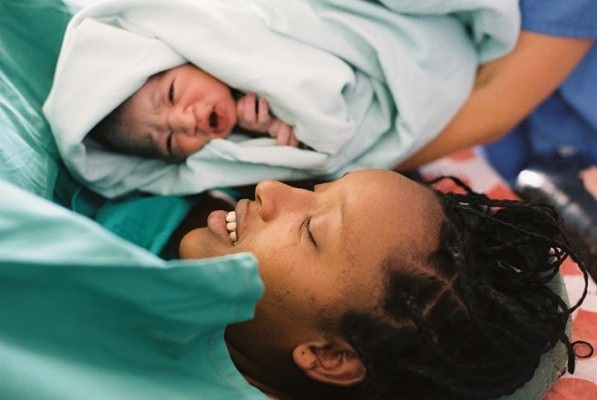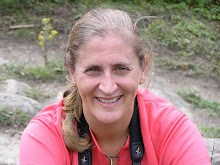March 16th
I find it hard to believe that I only have eight days until I finish my time in Gimbi. Of course there are certain things that have made the time seem long (missing Mark, the healthy but predictable food & the absence of red wine to name a few) but in most ways the time has flown by in a way that I didn't expect when I was homesick in my first few days. Although it is inevitable that I will begin a countdown and start to make packing lists in my head, I have to remind myself that there is still plenty to do each day and that the remaining eight days are still 10% of my overall time here and so to keep at it.
Apart from covering labour ward and doing occasional theatre cases (although I have revisited my gynaecology skills you will be relieved to hear that gynae surgery is limited to me being either supervised or acting as a skilled assistant in a complex case for Tekle or Steve (Gynaecologist from Australia)) most of the day is spent doing outpatients.
I always joke that the King's maternal assessment unit is the most used part of the hospital based on square feet of space (it is a small area with a bit attendance rate) but the "out-patient clinic" here vastly exceeds its performance on a space per consultation basis.
The clinic room is about 8 feet by 8 feet- contains desk, couch, scan machine, the hand washing station (in the absence of a sink we use a water canister with plastic tap and washing up bowel below to catch the water) and three chairs.
The three chairs may seem like a luxury given the size of the room but it is not uncommon to have five people in this room (1-2 doctors with possible medical student, patient, Ashemi (our fabulous practical worker- who is below the level of a nurse in qualifications but acts as translator Oromo-Amharic-English as necessary and does blood pressures, couch clean ups and assists in procedures if required) and a nursing student. The partners (in this society almost always husbands) of the women are never allowed in the room to the point where the door will be slammed in their faces by Ashemi if the try to follow her in- I suspect in a society where the status of women is still less than that of the men and where domestic violence is very common this is a good practice as it allows them to speak for themselves without fear although I am not sure that these are the reasons that would be given for partner exclusion as oppose to the physical constraints of the consulting room and that the doctors here like to keep confrontation to a minimum. The women will often call their husbands in at the end of the consultation if surgery has been recommended, as the issue of whether he can & will pay for the operation needs to be discussed.
So in this space we see between 15-20 patients (we see the most on Wednesday which is the main market day and there is also a season increase in numbers after the coffee harvest in February when people have "relatively" more money to address health issues) between 10am & 4pm with a strict break for lunch 1pm-2.30pm. (the clinic is open six days a week with a break for the Adventist Sabbath on Saturday). The uncertainty in numbers is because there is no appointment system and we effectively see all "comers", the majority of the women arrive through the morning with the afternoon being for a few women who have travelled far to get here or for reviewing of results from any investigations from the morning clinic. There is no waiting room and the women & their relatives wait in the corridor outside, clamouring around the door every time it is opened in belief that this will make it more likely that they will seen next (actually a wasted effort as we operate a strict first come first served system unless someone is obviously unwell). Overall it is not a clinic environment for any one with even mild claustrophobia!
The patients may be follow-ups after surgery or antenatal women with known risk factors (such as twins, recurrent stillbirth, raise BP). Women will also be referred from other external clinics or even from the new Gimbi government hospital (they don't seem to have a gynaecologist there yet) with a suspected significant obstetric/gynaecology problem rather like the referral from a GP in the UK. However the majority of the women come from internal clinics within this hospital. There is an antenatal clinic run by skilled birth attendants every day and women will be referred from there if there is uncertainty about dates (very common as women rarely know when their last period was let alone the date if they do remember) or a risk factor has been identified requiring a doctor to review)-these referrals are usually appropriate but unfortunately the problem referrals come from the main medical/GP outpatient clinic. This clinic is "over-run" with patients and is staffed only by trained nurses (there is sometimes a GP type doctor but this is a post that the hospital struggles to fill and so often there is no medical supervision). Thus what I call the "in-tray phenomenon" is common, this involves a need to shift a segment of your workload into someone else's in-tray regardless of whether this is appropriate or not- as a result we get women with minor period problems or abdominal pain sent down to us, referrals in the UK that would be managed by a GP and never require "specialist" review. More worryingly, it is not uncommon to get a card that read, "Complaining of shortness of breath, night time fevers, joint pains-also difficulty in conceiving (or insert any other minor gynaecological problem). Refer gynaecology OPD". This is tiresome for the patient as inevitably we have to send them back for their TB/malaria/worm infestation to be treated as the other problems uncovered by questioning are not issues for them or the main issues need to be addressed first.
History taking is fraught with difficulty- some created by the need for translation but some related to what can only be summarised as an "inability to answer a straight question" (women often seem to have an agenda and want to answer their own set of questions that may be of little help in making a diagnosis). A straight question like "how many children does she have?", can result in a two-way discourse between the woman and Ashemi (clinic translator) lasting a number of minutes with the answer "two "(or whatever) being returned at the end of the discussion- it is a bit of a mystery. The other problem is that cultural taboos mean it can be difficult to elicit the true complaint for a significant part of the consultation if a woman has come because of infertility, worries about pregnancy losses or even certain types of pain- I often wonder how many women have gone through the whole consultation without being able to find the courage to tell me why they have really come.
Having elicited some sort of history most women require some sort of examination and we are fortunate to have our trusty little scan machine which is a god-send especially for obstetric patients allowing us to accurately date their pregnancy and confirm or refute twins. It is also useful for gynaecology and it is amazing how much gynae pathology a fetal medicine doctor can pick up when she has to but then again who knows how much pathology I have missed?
Internal examination initially caused me some surprise (and amusement) as underwear choices here are different compared to a clinic in the UK- women seem to split three ways in their garment selection with about one third of women choosing the Marilyn Munroe option (for completely different underlying reasons I assume although not absolutely sure of the motivation of MM or the women here in going combat) and wearing no underwear, one third wearing M&S type big knickers and the final third wearing silky football shorts (I reliably informed that these are most often in English club colours). Regardless of the style you will be relieved to hear that they are known by that good Oromifa/Amharic word "panties"!
Making a gynaecological or other diagnosis can be difficult as we have few investigation available (no laparoscopy, colposcopy, smear test, hormonal blood tests or even swabs for infection) and even if we make a diagnosis the list of drugs available for treatment is very short with the contraceptive pill or depot injection being our only available hormonal treatment of any kind. This creates difficulty as I've mentioned before that patients feel that they have value for money from their outpatient visit only if they have investigations and leave with a prescription. As an example yesterday a woman with a history of two previous stillbirths at home, asked me for a prescription of" pills" to help her problem after I had confirmed she wasn't rhesus negative (we don't give any anti-D here so "rhesus" babies will still occur commonly) , didn't have syphilis (still relatively common here) and recommended that we see and follow her from an early stage in her next pregnancy.
Perhaps there is some beneficial placebo effect in investigating/prescribing unnecessarily but I have stubbornly refused to do this. As a result some of my patients may be disappointed that I won't organise unhelpful investigations for the sake of it or give a short prescription of anti-depressants or other non-specific medication so that they leave clinic feeling good in the short-term but with the result that they are significantly poorer as every test and medication costs their hard-earned burr.


No comments:
Post a Comment